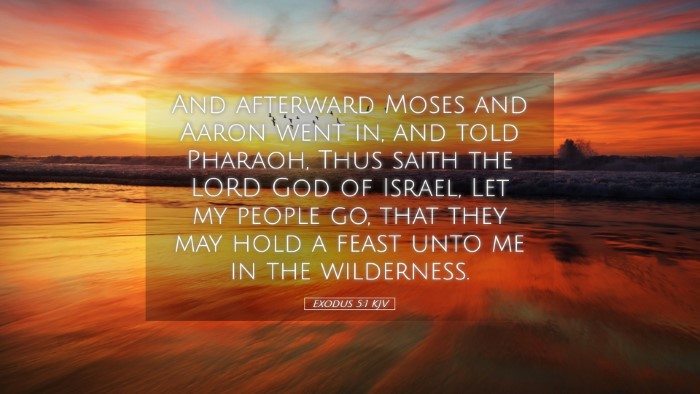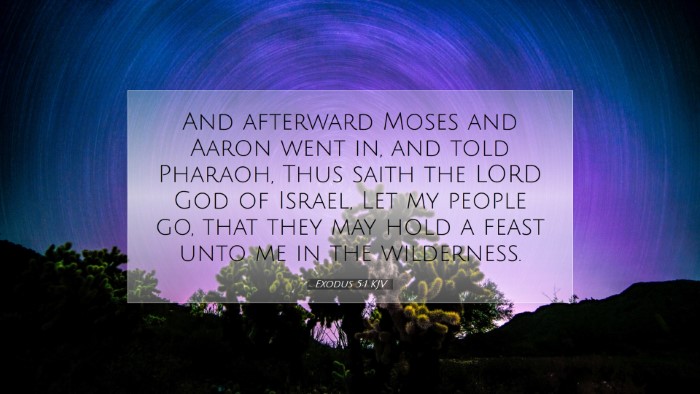Exodus 5:1 - Commentary Summary
Verse: “And afterward Moses and Aaron went in, and told Pharaoh, Thus saith the Lord God of Israel, Let my people go, that they may hold a feast unto me in the wilderness.”
Contextual Background
This particular verse marks a pivotal moment in the narrative of Exodus, where Moses and Aaron, chosen instruments of God, venture into the heart of Egyptian authority to deliver a divine message. This event not only serves as the commencement of the liberation movement for the Israelites but also sets the stage for a powerful demonstration of God's sovereignty over earthly rulers.
Theological Implications
- Divine Authority: The phrase “Thus saith the Lord” emphasizes the authority with which Moses and Aaron speak. It is essential to recognize that they do not come as mere diplomats but as ambassadors of the Almighty.
- God's Intentions: The command “Let my people go” reveals God’s desire for the Israelites to worship Him freely. The request for a feast in the wilderness underscores the importance of both physical liberation and spiritual deliverance.
- Pharaoh's Heart: As is common in biblical narratives, Pharaoh’s hardened heart is an essential theme. His initial resistance foreshadows a series of confrontations that will culminate in the demonstration of God's power through plagues.
Commentary Insights
Matthew Henry's Commentary
Henry emphasizes the significance of God’s command and the faithfulness of Moses and Aaron in delivering it. He notes the intentionality behind the request for the Israelites to “hold a feast,” which not only showcases the intention of worship but also represents a longing for fellowship with God. Henry stresses that the ultimate purpose of liberation is not merely freedom from bondage but a restored relationship with God.
Albert Barnes' Notes
Barnes offers insight into the character of Pharaoh, noting that his arrogance and pride were well-known. He interprets the command as an assertion of God's supremacy over the Egyptian gods and the Pharaoh himself, whose status was considered divine by his people. Furthermore, Barnes reflects on the implications for the Israelites, emphasizing that this historical confrontation illustrates God's commitment to His covenant people.
Adam Clarke's Commentary
Clarke draws attention to the significance of the phrase “let my people go,” interpreting it as a declaration of God’s ownership of the Israelites. He elaborates on the historical context, suggesting that the request for a feast is a timely argument in the face of slavery, a reminder that they are to serve only one true God. Clarke underlines the necessity of obedience in worship and the profound implications of being called a people set apart for God’s purposes.
Applications for Pastors and Theologians
- Preaching Liberation: This verse presents an opportunity for pastors to explore themes of spiritual and physical liberation in their sermons. The narrative challenges congregations to consider what 'slavery' might look like in their lives today.
- Emphasizing Worship: The call to hold a feast in the wilderness serves as a reminder of the importance of worship in the life of a believer. This presents a platform to highlight the necessity of genuine worship that transcends mere ritualistic practice.
- Understanding Resistance: The interaction with Pharaoh can be a basis for discussing spiritual warfare and the resistance faced when advancing God’s kingdom, urging believers to remain steadfast in their faith despite opposition.
Conclusion
Exodus 5:1 is a foundational text that serves both historical and theological purposes within the Biblical narrative. It encapsulates the dual themes of liberation and worship while foreshadowing a significant confrontation between divine authority and human pride. Understanding this verse within its broader context allows pastors, students, and scholars alike to appreciate the richness of God's plan for His people and the ongoing relevance of this narrative in contemporary faith discussions.


